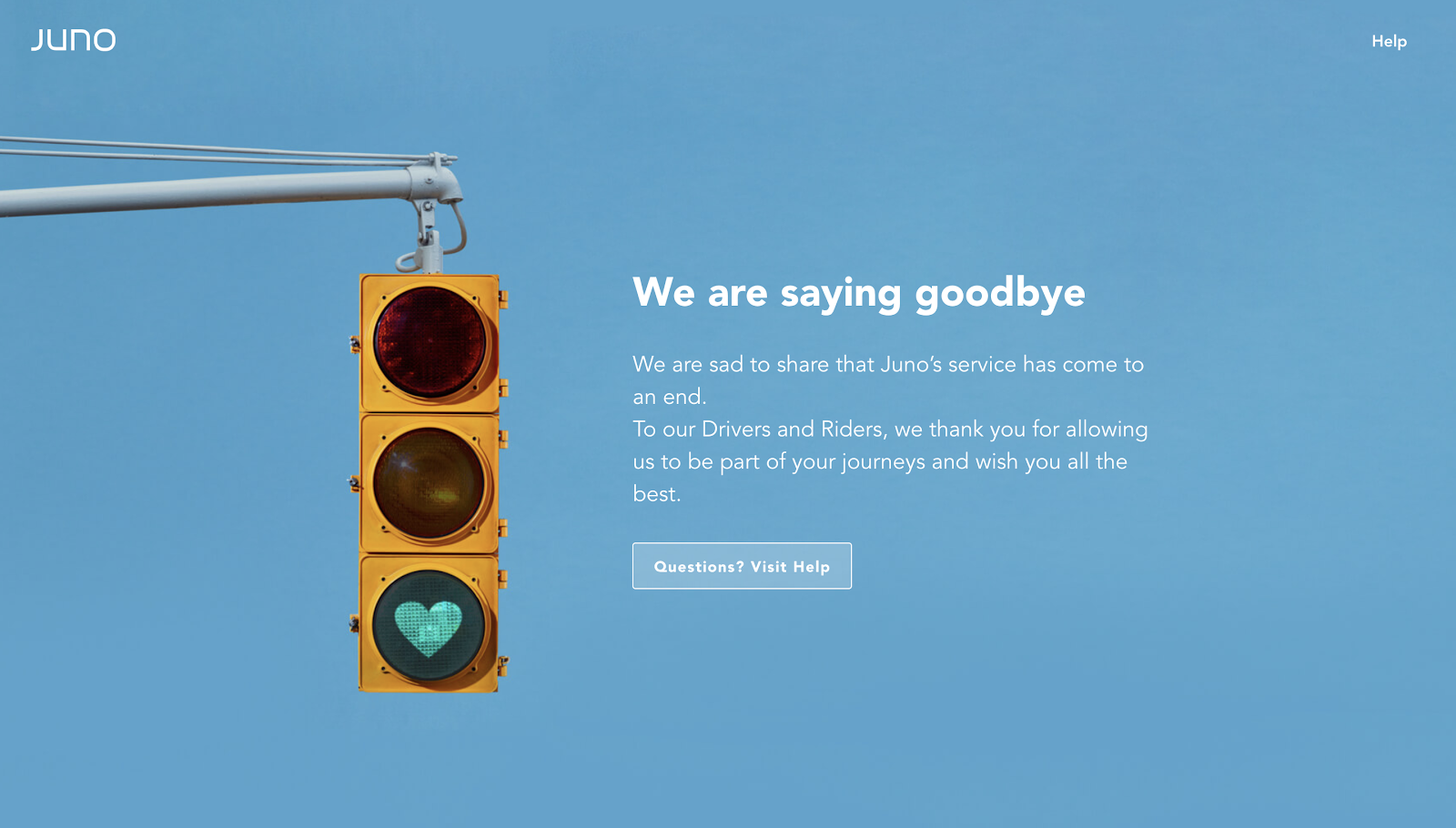Monday, ride-hailing company Juno announced that it would be shutting down effective immediately. That means no more rides in New York City, Tel Aviv, Portland (Oregon), and Minsk. Parts of the company’s website now look like this: Juno’s owner, another ride-hailing company called Gett, also announced a “strategic partnership" with Lyft to provide rides to corporate clients in the United States starting next year.In a press release, Gett said it had served "over 15,000 companies" (down from a 20,000 figure reported by TechCrunch last year) and that the Lyft partnership would let corporate clients use the Gett app to request Lyft drivers, "seamlessly serving its business clients on the Lyft network." In plain-speak, Gett is rebranding as a luxury service—not unlike Uber’s origins as a limousine timeshare service.This is all a far cry from a company that was supposed to be an “anti-Uber” that prided itself on treating drivers better. At one point, Juno’s founder was promising things then-unheard of in the ride-hailing industry: higher pay rates and lower company commission, a dedicated 24/7 call center servicing them, equity for drivers, and eventually giving them the option to be considered employees of the company.Within one year of its entrance to New York City, Juno was bought by Gett for $200 million and began “nickel-and-diming” its drivers. Its stock program was immediately terminated. The company has also fought against attempts to provide a minimum wage for drivers, raising concerns that higher pay would “destroy competition.”Earlier this year, despite raising $30 million in investor funding and despite Gett’s own valuation of $1.5 billion, Juno was seeking a buyer. It turns out that Juno was right. There was never any hope of competing with Uber or Lyft because those companies simply have more money. Uber’s business strategy is to literally burn piles of money until competitors are driven into the ground. Juno had $30 million in investor funding, but Uber has lost nearly $30 billion: $20 billion in investor funding leading up to its IPO, another $5.2 billion the following fiscal quarter, and then $1.2 billion this last fiscal quarter.You can’t make Uber’s business model ethical, because it’s premised on spending tens of billions in venture capital to eventually achieve a monopoly, cut labor costs (wages, health care, etc.), and jack up passenger fares.So long as private companies seeking a profit are involved in transportation, you will likely see other companies billing themselves as the new “anti-Uber,” only to sell out before dying out.
Juno’s owner, another ride-hailing company called Gett, also announced a “strategic partnership" with Lyft to provide rides to corporate clients in the United States starting next year.In a press release, Gett said it had served "over 15,000 companies" (down from a 20,000 figure reported by TechCrunch last year) and that the Lyft partnership would let corporate clients use the Gett app to request Lyft drivers, "seamlessly serving its business clients on the Lyft network." In plain-speak, Gett is rebranding as a luxury service—not unlike Uber’s origins as a limousine timeshare service.This is all a far cry from a company that was supposed to be an “anti-Uber” that prided itself on treating drivers better. At one point, Juno’s founder was promising things then-unheard of in the ride-hailing industry: higher pay rates and lower company commission, a dedicated 24/7 call center servicing them, equity for drivers, and eventually giving them the option to be considered employees of the company.Within one year of its entrance to New York City, Juno was bought by Gett for $200 million and began “nickel-and-diming” its drivers. Its stock program was immediately terminated. The company has also fought against attempts to provide a minimum wage for drivers, raising concerns that higher pay would “destroy competition.”Earlier this year, despite raising $30 million in investor funding and despite Gett’s own valuation of $1.5 billion, Juno was seeking a buyer. It turns out that Juno was right. There was never any hope of competing with Uber or Lyft because those companies simply have more money. Uber’s business strategy is to literally burn piles of money until competitors are driven into the ground. Juno had $30 million in investor funding, but Uber has lost nearly $30 billion: $20 billion in investor funding leading up to its IPO, another $5.2 billion the following fiscal quarter, and then $1.2 billion this last fiscal quarter.You can’t make Uber’s business model ethical, because it’s premised on spending tens of billions in venture capital to eventually achieve a monopoly, cut labor costs (wages, health care, etc.), and jack up passenger fares.So long as private companies seeking a profit are involved in transportation, you will likely see other companies billing themselves as the new “anti-Uber,” only to sell out before dying out.
Advertisement
